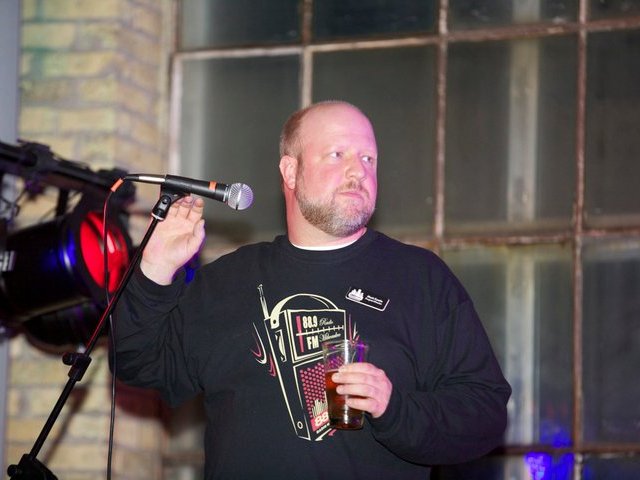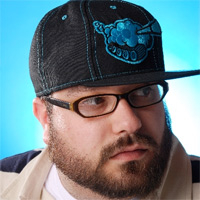The radio industry is a tough business, especially in this economy, and even more so for a listener-supported station.
Though the Milwaukee metro area has only a little more than a million residents, the area enjoys three different major listener-supported radio stations on the FM dial.
The newest of the three is 88Nine Radio Milwaukee, a station that recently celebrated its fourth anniversary.
A little over a year ago original program director, Scott Mullins, left 88Nine for a larger radio market and a Triple-A – Adult Album Alternative – station, during a time when several of Milwaukee's media were launching major criticisms of the station (I was among them).
Walking into the fire was new PD Mark Keefe, a radio veteran who has a deep love for music as well as the medium of radio.
After a year on the job, it seemed time to talk to Keefe about his move to Milwaukee, how he handled the negative attention he walked into and how the station is doing four-plus years after its birth.
OnMilwaukee.com: You've been on the job at 88Nine for a year and some months now. How's it going?
Mark Keefe: Really well, but extremely busy. Milwaukee is a town that crams an awful lot of activity into its summer, so it follows that Radio Milwaukee is twice as active each summer, as well. We're wrapping up all the major summer planning and getting everyone ready for a very active season.
OMC: When you came to 88Nine, it was during a period when it seemed that everybody was coming at Radio Milwaukee about something they were or weren't doing, in addition to a controversial exit interview with former PD Scott Mullins. How did you manage to settle in and turn the metaphorical guns away from the station?
MK: When I got here, I saw a little of the fireworks, but they subsided after Scott's departure. The easiest way to settle in was to let everyone know that I had almost no knowledge of the people and activities that came before me. I reached out to various people in the community who I'd been told had "challenged" relationships with my predecessors, had lunch or other meetings with them and asked that they extend to me the courtesy of showing them I intended to conduct myself professionally.
Radio Milwaukee is a very young organization – we just celebrated our fourth year on the air – so much of the last four years can be attributed to growing pains. But the foundation that was laid by my predecessors was very strong and I've been able to build on it in the last 14 months.
OMC: You are a Southerner. We can call Louisville the South, right? Now that you've experienced all four seasons Wisconsin has to offer, do you regret leaving the warmer climate of the South?
MK: I'm definitely a Southerner – born in Shreveport, La., on an Air Force base, raised in Louisville, where most of my family still resides. When I accepted the program director job here in Milwaukee, I was the operations manager of a four-station commercial radio cluster in Reno, Nev., and had been there for about three and a half years.
As it seems the case in radio, I've moved around a bit – school at Xavier University in Cincinnati, first commercial and non-commercial radio gigs there, and then in North Carolina for 10 years – both the mountains and the coast. I have to say I've loved every place I've lived, for different reasons. Strangely, I'd rather not live at the beach – it makes you appreciate it more when you visit it for vacation.
As for the seasons here, winter was pretty intense but it wasn't a deal killer. I broke my elbow in March and several people were concerned that I'd want to leave. No way – I like Milwaukee and it would take a lot more than a broken bone to get me out of here.
OMC: Every program director follows a different formula for what music gets picked to be played and what doesn't. What's your method? Does it have to make you finger dance, chair dance, literally dance or something else?
MK: My method isn't exactly scientific, it's more about getting a feel for what the sound of "Radio Milwaukee" is, and then programming with that sound in mind at all times. We conduct weekly music meetings with the entire air staff and each person is able to bring in two songs that everyone evaluates. It's a fun and constructive process – it's given me a chance to see the staff's ideas of what they think should get added to the station, but now everyone says things like "That is or isn't Radio Milwaukee music."
Personal agendas are pretty much gone. But it needs to be said that we don't play everything – there's a structure that I've laid out and while there's a lot of room for new and diverse music, some bands and songs are going to get left out.
OMC: Radio Milwaukee attaches its name to a lot of events and happenings going on in Milwaukee. What does having the station rooted in the community mean to you? Is this unique to Milwaukee or can you find a station like 88Nine in other metropolitan areas?
MK: Having our station rooted in the community means everything to Radio Milwaukee. We want to be a place where people can come to hear not just the music of Milwaukee and beyond, but also stories about the people and organizations making Milwaukee a great place to live. We integrate Milwaukee music into every local hour of our programming and devote time every hour to tell a story about things that make a positive difference in our community.
The model works for us thanks to the support of our growing listening audience. There are some stations with similar playlists to Radio Milwaukee, but I'm not aware of any that devote as much time as we do to community organizations and non-profits throughout each broadcast day.
OMC: Last year I openly criticized 88Nine for their lack of new local hip-hop in the rotation, and soon after – whether or not it had anything to do with me – new local hip-hop was placed in rotation. We didn't know each other at that point and when we did finally meet for a chat in your office, I found that you were especially amiable on the topic. Why sit down with a faceless guy that had previously ripped apart your station?
MK: Really, I knew I'd like you if I just had a chance to talk with you face to face. I saw how passionate you were – and are – about the Milwaukee music scene, and all you needed to know was that I'm similarly passionate about it, as well.
My perspective comes from running a radio station, so all I needed to do was assure you that I spend every day working to make Radio Milwaukee a better station, which ultimately strengthens our music scene and the people in it.
Your expectations – and the expectations of others – just need to be managed properly by my proving that I have the best interests of the station in mind at all times, and that those interests always include Milwaukee music. It takes time to get everything under control musically, so I just hadn't had enough time when you approached me to freshen some of the music you were concerned about. Honestly, I'm pretty easy to talk to and like talking to anyone who listens to our station.
OMC: What the best part of your day on the job?
MK: Talking with every member of the staff individually every day. Our staff is very active and creative and all of the on-air hosts have great ears, so we spend a lot of time running music by each other and talking about new discoveries. We laugh a lot and get excited about things we find online and open in the mail every day.
OMC: 88Nine comes off like a family. Is that an important aesthetic to have at a radio station?
MK: It is at Radio Milwaukee. What we broadcast is very unique, so we can't have someone who treats this as a job they're doing while they look for their next gig. Turnover is a drag at any station or organization, and we've had our share. I really believe that now we have a staff that wants to be here and wants to contribute as much as they're able to make the station a success for our listeners and all of Milwaukee.
As a programmer who has been in both commercial and non-commercial radio, I understand the challenges that each faces. I'm amazed at how good WMSE and WUWM sound here at the left end of the dial, and am impressed with what some of our commercial brethren accomplish with all of their challenges. Milwaukee has more to choose from on its radio dial than cities many times its size.
OMC: What is your vision for Radio Milwaukee and how does the station get there?
MK: I want Radio Milwaukee to be seen as a resource that the city can rely on for great music and information – that's what we work hard toward every day here. When I was in commercial radio, I used to take a moment right before a ratings book came out to ask myself if I had done everything I could to make the station I worked at the best I could make it.
Now, I ask myself that same question right before our fund drives. My answer has been "yes," and judging from the ever-expanding listening audience and their generous contributions during our fund drives, I'd say the answer is still "yes," and I'm grateful to find myself at a station like 88Nine in a town as special as Milwaukee.
Born in Milwaukee and raised in the Milwaukee suburb of Brown Deer, Concordia University Wisconsin alumnus Poppe has spent the majority of his life in or around the city and county of Milwaukee.
As an advocate of Milwaukee's hip-hop community Poppe began popular local music blog Milwaukee UP in March 2010. Check out the archived entries here.
Though heavy on the hip-hop, Poppe writes about other genres of music and occasionally about food, culture or sports, and is always ready to show his pride in Milwaukee and Wisconsin.



